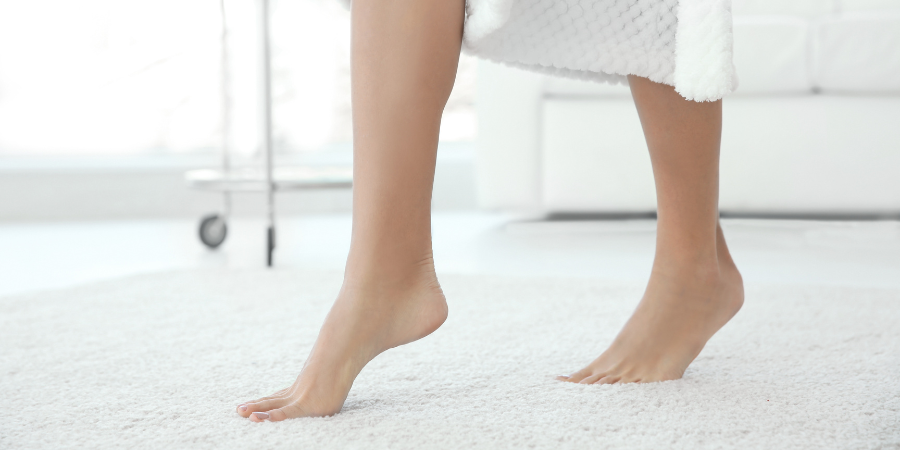A shower floor that feels soft is undoubtedly a floor that has been invaded by leaking water. Water can work its way behind tiles and under shower bases, causing a breakdown in the supporting structure. This decay is recognized through a soft-feeling floor.
A shower floor supports an enormous amount of weight from the materials used to construct it. Wooden subflooring, plywood, and drywall are covered in a waterproof sealant, and then a decorative layer is added for style and design purposes. The weight of these components adds up quickly, and when you add a human to the mix, you can understand why a well-maintained support structure is important.
In this article, we will learn about shower substructures and popular materials used to finish wall and floor areas. We will then examine the different ways water can find its way underneath these aesthetically appealing surfaces where mold and decay can grow leaving behind a shower floor that feels soft, is unsafe, and may be causing you and your family health issues.
Shower Substructures
Behind and under every floor in your home lies hidden wooden studs, plywood, insulation, drywall, electrical and plumbing parts, and components of your HVAC system, which holds true in your bathroom.
In addition to these components, the bathroom has a waterproof membrane to prevent water from your tub or shower from penetrating the drywall and being absorbed into the insulation and wood supports.
If the walls or floor of the shower are grouted, it is essential this waterproofing be professionally installed since the smallest amount of water passing into the substructure can result in damages requiring the removal of the shower entirely.
The Shower Floor
Shower floors, also known as shower trays or pans, can be made of plastic, cast polymer, concrete/stone mixtures, or other solid-surface materials. A solid sheet of material is best, as grouting can be greatly reduced and, therefore, the change of water seeping behind the surface.
Slope
Slope in the shower is important for keeping unwanted water at bay. A shower floor should be sloped so all the water on the floor is directed to the drain. Water that continuously puddles can eventually work its way behind grouted flooring unless the showerer dries the floor completely after each shower, a very unlikely scenario!
Drains
Shower drains can also contribute to soft shower floors. An improperly installed drain can allow water to back up and seep under the subflooring, and a clogged drain line can place so much pressure on the pipe it could burst, flooding the area beneath the shower.
Since these issues occur out-of-sight, they can continue for long periods of time, causing extensive mold growth, rot, and a soft floor.
Grout
On surfaces that require grouting, such as ceramic or porcelain tile, the possibility of water penetration increases. As water is in contact with the grout, it can slowly absorb the water, and once water gets behind the tile, especially if no waterproofing or poor waterproofing was applied. Grout penetration on poorly built showers is the number one reason for a soft shower floor.
Material Types
Shower floors can be constructed of as many materials as you can imagine, although many are aesthetically pleasing but structurally disastrous. Some common materials found in today’s modern showers will be discussed here.
Concrete
Concrete is a modern and frequently requested shower floor option. It is durable so able to withstand heavy traffic. It is easy to clean and requires minimal maintenance. The key to a successful concrete shower floor is it must be properly sealed.
Marble
Marble is luxurious, and with thousands of options, there is a marble for everyone. The issue with marble is it can be slippery, so be certain to choose a slip-resistant type. We like marble because it creates a good defense against water infiltration and is an option we strongly recommend.
Porcelain Tile
Porcelain tiles are popular since the design possibilities are endless. They are also a good choice because they resist moisture and mold, the two conditions present with soft shower floors.
Ceramic Tile
We tell our customers to avoid ceramic tiles despite their attractive cost. They are less dense than porcelain and are known to crack more easily than other options.
Synthetic Options
Fiberglass bases are common in shower floors. They do tend to become brittle over time, and that leads to cracking and an invitation for water invasion.
Acrylic is a better synthetic option and although not a dramatic fashion statement, it does hold up better than fiberglass. This is due to a finish coating applied to the acrylic that helps it resist cracking and mildew growth. An all-around good option when water tightness is the goal.
Looking To Eliminate A Soft Spot On Your Shower Floor?
Proper installation and high-quality materials can protect your shower floor from water infiltration and softening. If you have a problem with a soft spot, we are here to help. We understand the construction of a shower stall and how to correct issues that may send your shower to premature retirement.
Call us today to discuss your problems, and together, with our expertise and your commitment to safety and comfort, we can devise a solution and get you back to showering on a solid surface in no time! Pick up the phone, we’d love to hear from you!
Need an emergency plumber in Orange County? Contact us today!






